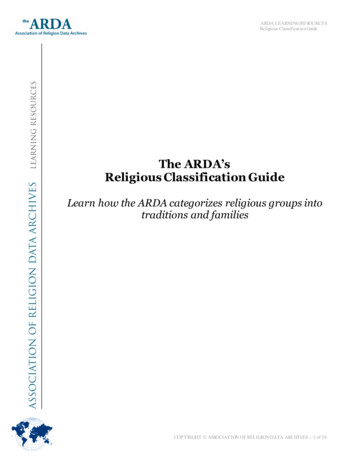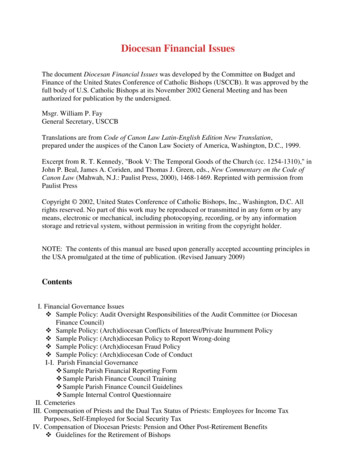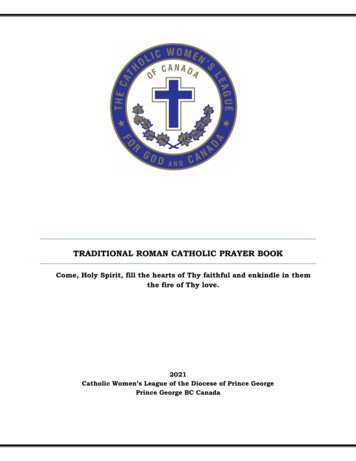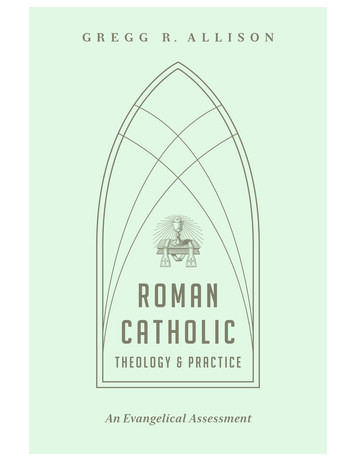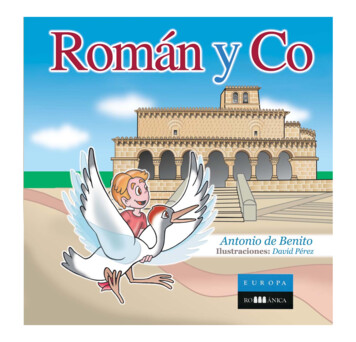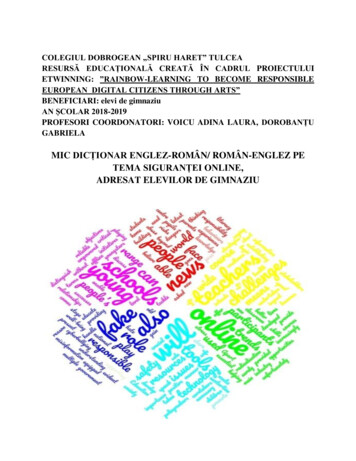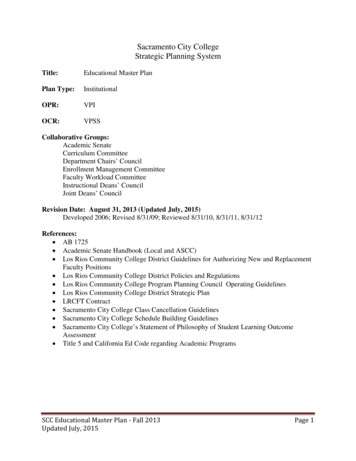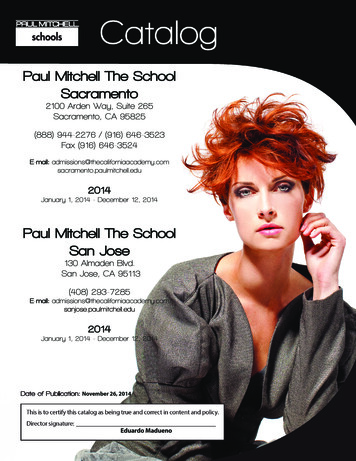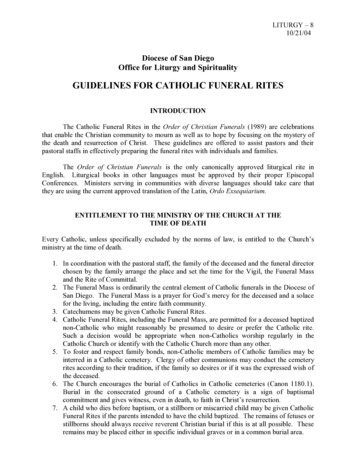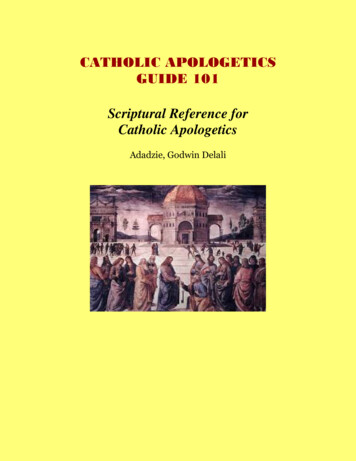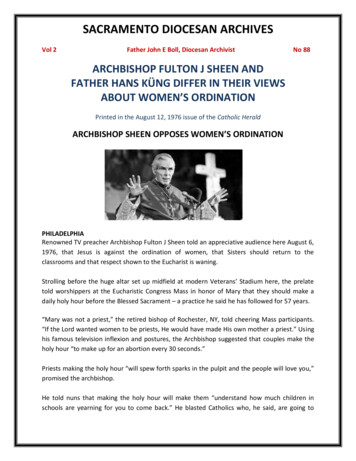
Transcription
SACRAMENTO DIOCESAN ARCHIVESVol 2Father John E Boll, Diocesan ArchivistNo 88ARCHBISHOP FULTON J SHEEN ANDFATHER HANS KÜNG DIFFER IN THEIR VIEWSABOUT WOMEN’S ORDINATIONPrinted in the August 12, 1976 issue of the Catholic HeraldARCHBISHOP SHEEN OPPOSES WOMEN’S ORDINATIONPHILADELPHIARenowned TV preacher Archbishop Fulton J Sheen told an appreciative audience here August 6,1976, that Jesus is against the ordination of women, that Sisters should return to theclassrooms and that respect shown to the Eucharist is waning.Strolling before the huge altar set up midfield at modern Veterans’ Stadium here, the prelatetold worshippers at the Eucharistic Congress Mass in honor of Mary that they should make adaily holy hour before the Blessed Sacrament – a practice he said he has followed for 57 years.“Mary was not a priest,” the retired bishop of Rochester, NY, told cheering Mass participants.“If the Lord wanted women to be priests, He would have made His own mother a priest.” Usinghis famous television inflexion and postures, the Archbishop suggested that couples make theholy hour “to make up for an abortion every 30 seconds.”Priests making the holy hour “will spew forth sparks in the pulpit and the people will love you,”promised the archbishop.He told nuns that making the holy hour will make them “understand how much children inschools are yearning for you to come back.” He blasted Catholics who, he said, are going to
Mass “in the state of mortal sin” and those who “go before the Savior as if they were going fora pizza.”The 81 year old archbishop harshly criticized what he called a current “de-eucharization.” “Howoften I have entered small churches and I have had to search for Our Lord in the Eucharist,” theprelate declared. “I say with Mary Magdalene, “They’ve taken away my Lord and I do not knowwhere they have laid Him. He’s been shoved off to a corner and some priest stands before thealtar as a kind of tin god.”The prelate said that historically a decline in Marian devotion has been joined to a “decrease inlove of the Holy Eucharist.”He responded to a standing ovation from 50,000 people by returning to the center of the altarplatform to take a bow.Archivist’s NoteThe following information about Archbishop Sheen comes from the Internet:Fulton John Sheen, born Peter John Sheen, (May 8, 1895 – December 9, 1979) wasan American bishop and later an archbishop known for his preaching and especially his work ontelevision and radio. His cause for canonization as a saint was officially opened in 2002. In June2012, Pope Benedict XVI officially recognized a decree from the Congregation for the Causes ofSaints stating that he lived a life of "heroic virtues" – a major step towards beatification – so heis now referred to as "Venerable".Ordained a priest for the diocese of Peoria in 1919, Father Sheen quickly became a renownedtheologian, earning the Cardinal Mercier Prize for International Philosophy in 1923. He went onto teach philosophy and theology at the Catholic University as well as acting as a parishpriest before being appointed Auxiliary Bishop of the Archdiocese of New York in 1951. He heldthis position until 1966 when he was made bishop of Rochester from October 21, 1966 toOctober 6, 1969, when he resigned and was made the archbishop of the Titular See of Newport,Wales.For 20 years, Father Sheen, (later a Monsignor), hosted the night-time radio program TheCatholic Hour (1930–1950) before moving to television and presenting Life Is WorthLiving (1951–1957). Bishop Sheen's final presenting role was on the syndicated The BishopFulton Sheen Program (1961–1968) with a format very similar to that of the earlier Life is WorthLiving show. For this work, Bishop Sheen twice won an Emmy Award for Most OutstandingTelevision Personality, the only personality appearing on the DuMont Network ever to win amajor Emmy award.Starting in 2009, his shows began to be re-broadcast on the EWTN and the Trinity BroadcastingNetwork's Church Channel cable networks. Due to his contribution to televised preaching,Archbishop Sheen is often referred to as one of the first televangelists.
FATHER HANS KÜNG CALLS FOR ORDINATION OF WOMENTübingen, GermanyFather Hans Küng has come out in favor of the ordination of women. In an article, “SixteenTheses for Women in the Church,” published here in the Tubingen Theological Quarterly, thecontroversial Swiss-born theologian who teaches at Tübingen University also urged a number ofother steps to promote women’s equality in the Church.“Calling God a father ought not to imply a sexist differentiation,” Father Küng said. “God is notto be identified with a masculine being.” He argued that the perspective of liturgical languageought to reflect the fact that the community of believers is made up of both women and men.He proposed that women be admitted in the Church to all executive positions. There are “noserious theological reasons against a female priesthood,” Father Küng said. Jesus did notsubscribe to rabbinical views prevailing in his day that were prejudicial to equal rights forwomen.Countering the often repeated claims that the Church’s deep veneration of Mary belies chargesof sexism, Father Küng said that to his mind, the veneration of Mary in worship is not sufficientto uphold women’s dignity in the social sphere.The priest also said that woman’s subjection to man “is a concept not keeping with the trueessence of Christian marriage.” He added that women should be given equal opportunities withmen in the family and in education.He said that true emancipation of women implies the right to practice “responsible birthcontrol.” In matters of abortion, not only the rights of the unborn, but also the physical andpsychic health of woman should be given proper consideration, he said.
Archivist’s Note: This information about Father Hans Küng comes from the InternetHans Küng was born in Sursee, Canton of Lucerne. He studied philosophy and theology at thePontifical Gregorian University in Rome and was ordained in 1954. He continued his educationin various European cities, including the Sorbonne in Paris.In 1960, he was appointed professor of theology at Eberhard Karls University, Tübingen,Germany. Like his colleague Joseph Ratzinger (later Pope Benedict XVI), in 1962 he was appointed peritus by Pope John XXIII, serving as an expert theological advisor to members ofthe Second Vatican Council until its conclusion in 1965. At Küng's instigation, the Catholicfaculty at Tübingen appointed Father Ratzinger as professor of dogmatic theology.In a 1963 tour of the United States, Küng gave the lecture "The Church and Freedom," receivingan interdict from The Catholic University of America but an honorary doctorate from St. LouisUniversity. He accepted an invitation to visit John F. Kennedy at the White House.Küng's doctoral thesis, Justification. La doctrine de Karl Barth et une réflexion catholique, wasfinally published in English in 1964. It located a number of areas of agreement betweenBarthian and Catholic theologies of justification, concluding that the differences were notfundamental and did not warrant a division in the Church. (The book included a letter from KarlBarth, attesting that he agreed with Küng's representation of his theology.) In this book Küngargued that Barth, like Martin Luther, overreacted against the Catholic Church, which despiteits imperfections has been and remains the body of Christ.In the late 1960s, Küng became the first major Roman Catholic theologian since the late 19thcentury Old Catholic Church schism to publicly reject the doctrine of papal infallibility, inparticular in his book Infallible? An Inquiry (1971). Consequently, on December 18, 1979, he wasstripped of his missio canonica, his license to teach as a Roman Catholic theologian, but carriedon teaching as a tenured professor of ecumenical theology at the University of Tübingen untilhis retirement (Emeritierung) in 1996. To this day he remains a persistent critic of papalinfallibility, which he claims is man-made (and thus reversible) rather than instituted by God. Hewas not excommunicated ferendae sententiae.For three months in 1981, he was guest professor at the University of Chicago. During this visitto America he was invited to only one Catholic institution, the University of Notre Dame. Heappeared on the Phil Donahue Show. In October 1986, he participated in the Third BuddhistChristian Theological Encounter held at Purdue University, West Lafayette, Indiana.In the early 1990s, Küng initiated a project called Weltethos (Global Ethic), which is an attemptat describing what the world's religions have in common (rather than what separates them) andat drawing up a minimal code of rules of behavior everyone can accept. His vision of a globalethic was embodied in the document for which he wrote the initial draft, Towards a GlobalEthic: An Initial Declaration. This Declaration was signed at the 1993 Parliament of the World'sReligions by religious and spiritual leaders from around the world. Later Küng's project would
culminate in the UN's Dialogue Among Civilizations to which Küng was assigned as one of 19"eminent persons." Even though it was completed shortly after the terrorist attacks of 9/11 (inSeptember 2001), it was not covered in the U.S. media, about which Küng complained.In March 1991, he gave a talk titled "No Peace Among Nations until Peace Among the Religions"at UCSD's Price Center. He visited the nearby Beth El Synagogue and spoke there on modernGerman-Jewish relations.In 1998, he published Dying with Dignity, co-written with Walter Jens, in which he affirmsacceptance of euthanasia from a Christian viewpoint.In 2003, Hans Küng saw the beatification of Pius IX as evidence of the degeneration ofcanonizations to "gestures of church politics.”In 2005, Küng published a critical article in Italy and Germany on The Failures of Pope Wojtyla.Küng argued that the world had expected a period of conversion, reform, and dialogue; butinstead politically John Paul II offered a restoration of the pre-Vatican II status quo—thusblocking reform and inter-church dialogue and reasserting the absolute dominion of Rome.This Papacy has repeatedly declared its fidelity to Vatican II, in order to then betray it forreasons of political expediency. Council terms such as modernization, dialogue, andecumenicalism have been replaced by emphasis on restoration, mastery, and obedience. Thecriteria for the nomination of bishops are not at all in the spirit of the Gospel. Pastoral politicshas allowed the moral and intellectual level of the episcopate to slip to dangerous levels. Amediocre, rigid, and more conservative episcopate will be the lasting legacy of this papacy.On September 26, 2005, he had a friendly discussion about Catholic theology over dinnerwith Pope Benedict XVI, surprising some observers.Nevertheless, in a 2009 interview with Le Monde, Küng deeply criticized the lifting of theexcommunications on the bishops of the Society of Saint Pius X. The interview drew a rebukefrom Cardinal Angelo Sodano. Based on Studium Generale lectures at Tübingen University, hislatest publication, Der Anfang aller Dinge (The beginning of all things), discusses therelationship between science and religion. In an analysis spanning from quantum physics toneuroscience, he comments on the current debate about evolution in the United States,dismissing those opposed to the teaching of evolution as "naive and un-enlightened.In his recent book Was ich glaube (Piper Verlag, 2010), he describes his own personalrelationship with nature, how he learned to observe correctly, drawing strength from God'screation without falling victim to a false and fanatic love of nature.In April 2010, he published in several newspapers an open letter to all Catholic bishops. In theletter, he criticized Pope Benedict's handling of liturgical, collegial and inter-religious issues andalso the sexual abuse scandals that have engulfed the Catholic Church. In the letter, he called
on bishops to consider six proposals, ranging from speaking up and working on regionalsolutions, calling for another Vatican council.He is a signatory of Church 2011, a German-language memorandum promulgated by Catholictheology professors.In the fall of 2013, Küng wrote in Erlebte Menschlichkeit (Experienced Humanity) that he feltthat people had the right to end their own lives if physical illness, pain, or dementia made livingunbearable. He further wrote that he was considering the option of assisted suicide for himselfas he is suffering from Parkinson's disease and is losing the ability to see and write with hishands. Küng wrote that he did not wish to follow the example of John Paul II in this case.Photo from Verlag Gebr Metz, TübingenTübingen University
Catholic Hour (1930-1950) before moving to television and presenting Life Is Worth Living (1951-1957). Bishop Sheen's final presenting role was on the syndicated The Bishop Fulton Sheen Program (1961-1968) with a format very similar to that of the earlier Life is Worth Living show. For this work, Bishop Sheen twice won an Emmy Award for .
